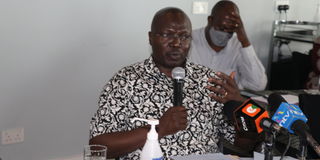Kenya to send 20,000 nurses to the UK, says Chelugui

Labour and Social Welfare Cabinet Secretary Mr Simon Chelugui answering questions from MPs on what his ministry is doing to protect Kenyans against labour exploitation abroad.
Kenya will send 20,000 nurses to the United Kingdom as it seeks to improve the welfare of its migrant workers abroad.
Labour and Social Protection Cabinet Secretary Simon Chelugui said the government has embarked on exporting highly skilled healthcare workers and professionals abroad.
On July 29, Kenya and the UK signed a pact that is expected to benefit unemployed medics.
Mr Chelugui disclosed that the two governments had agreed to send 20,000 nurses to the UK to address a shortage of 62,000 in that country.
The CS said the UK government has also committed to building the capacity of Kenya’s medical training colleges and universities to train more nurses.
Some 894 Kenyan nurses work in Britain’s public healthcare system, the National Health Service.
“We are exporting Kenyan nurses. Last month we were in London with President Uhuru Kenyatta and had discussions with the UK government, which agreed to take 20,000 of their 62,000 shortage of nurses trained in Kenya,” he said when he appeared at a meeting of the National Assembly’s Committee on Labour and Social Welfare in Mombasa.
“There is a benefit for us because our institutions are now being upgraded to international standards to offer training to fit the UK market.”
The first batch of nurses will leave Kenya by October 15.
The positions were advertised by the National Employment Authority. The government is evaluating applications before sending the documents to the Ministry of Health for confirmation and verification for interviews.
This is good news for at least 30,000 jobless Kenyan nurses and healthcare workers. Mr Chelugui said there are many opportunities for Kenyan migrant workers in the transport, medical and education sectors.
“Brexit is an opportunity for this country. The fact that Kenya’s education system, standards and language of instruction is English is a huge opportunity for our country. We are engaging our medical training schools to enhance capacity for the export market,” he said.
He said the government will streamline its labour migration sector to protect workers from exploitation.
“Migrant workers can contribute to development. In the last decade, remittances have significantly increased, reaching Sh310 billion from Sh1.04 billion in 2004,” he said.
“In 2020, Kenya, with Sh310 billion in diaspora remittances, was one of the top four highest remittance-recipient countries in Africa. Kenya lags behind Egypt (Sh2.9 trillion), Nigeria (Sh1.72 trillion) and Ghana (Sh360 billion).”
He said Central Bank of Kenya data shows that Kenyans in foreign countries sent home a monthly record of Sh34 billion ($315.8 million) in May, a 22 percent jump from the corresponding month last year.
“This is supported by higher flows from the US and Saudi Arabia. This is the first time diaspora remittances have crossed the $300 million mark, continuing to defy expectations of a dip due to the Covid-19 pandemic. Diaspora remittances are currently Kenya’s highest foreign exchange earner, having overtaken tea, coffee and tourism,” he added.
Mr Chelugui assured migrant Kenyan workers that the government will ensure their welfare is protected.
The government is also seeking to establish safe houses as temporary shelters for its citizens working abroad who are in distress before they transition to other employment or are repatriated.
This will be a relief to hundreds of Kenyans stranded in Gulf countries and elsewhere.
The State will also dispatch more labour attaches to countries where many Kenyans are working.
“Kenyans who have lost jobs are taken to deportation camps and sometimes they are mistreated or abused. But to protect Kenyans against such abuses we must allocate funds to establish safe homes. Other countries have done it,” Mr Chelugui said.
Statistics show that there were four million Kenyans in the diaspora in 2019, with over 200,000 in the Middle East. Of the total number, only 1.5 have been registered.
Data from the Ministry of Labour and Social Protection shows Kenyans work in Europe, the United States, Asia, Latin America, Canada, Australia, the Middle East and the Gulf region, Uganda, Tanzania, South Sudan, Rwanda, Botswana, Lesotho and South Africa.
The committee’s chairperson, Kabiga Wachira, urged the government to ensure that Kenyans are safe while working overseas.
“There are agents not complying with the rules. That’s why several migrant Kenyans are stranded. We have heard a lot of crying, especially on the ineffectiveness of our embassies in attending to their problems when they call in distress. Our embassies are not supporting our people,” he said.
But Mr Chelugui said his ministry will collaborate with those of Foreign Affairs and Interior to deal with rogue recruitment agencies.
He said the government has established three labour attache offices in Saudi Arabia, Qatar and the UAE but the number is inadequate.
“Saudi Arabia is almost the size of East and Central Africa and we only have one labour attache and yet we have the highest number of migrant workers (there). It is overwhelming. It’s almost humanly impossible for one person to handle 100,000 people,” he said, asking for more officers to be posted to the kingdom to address the challenges Kenyan workers face.
Hundreds of Kenyans working in the Middle East have been narrating their tribulations as workers in Gulf countries.





